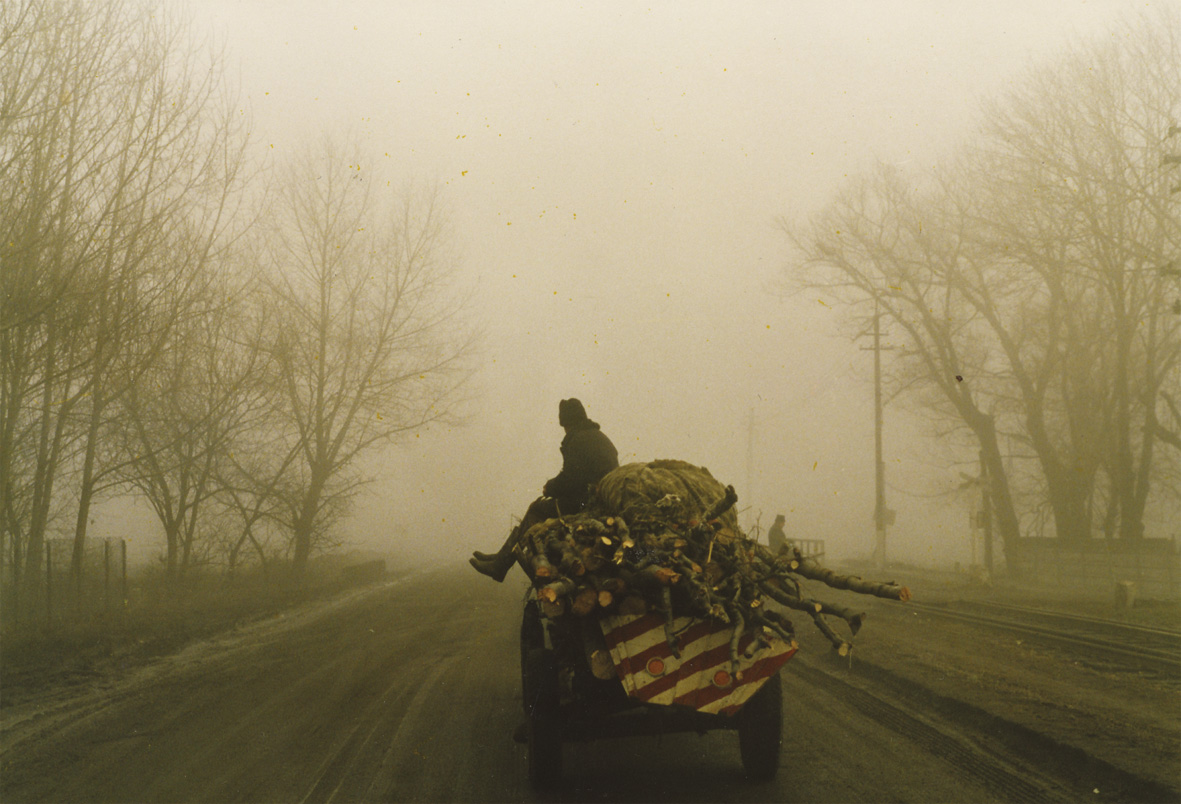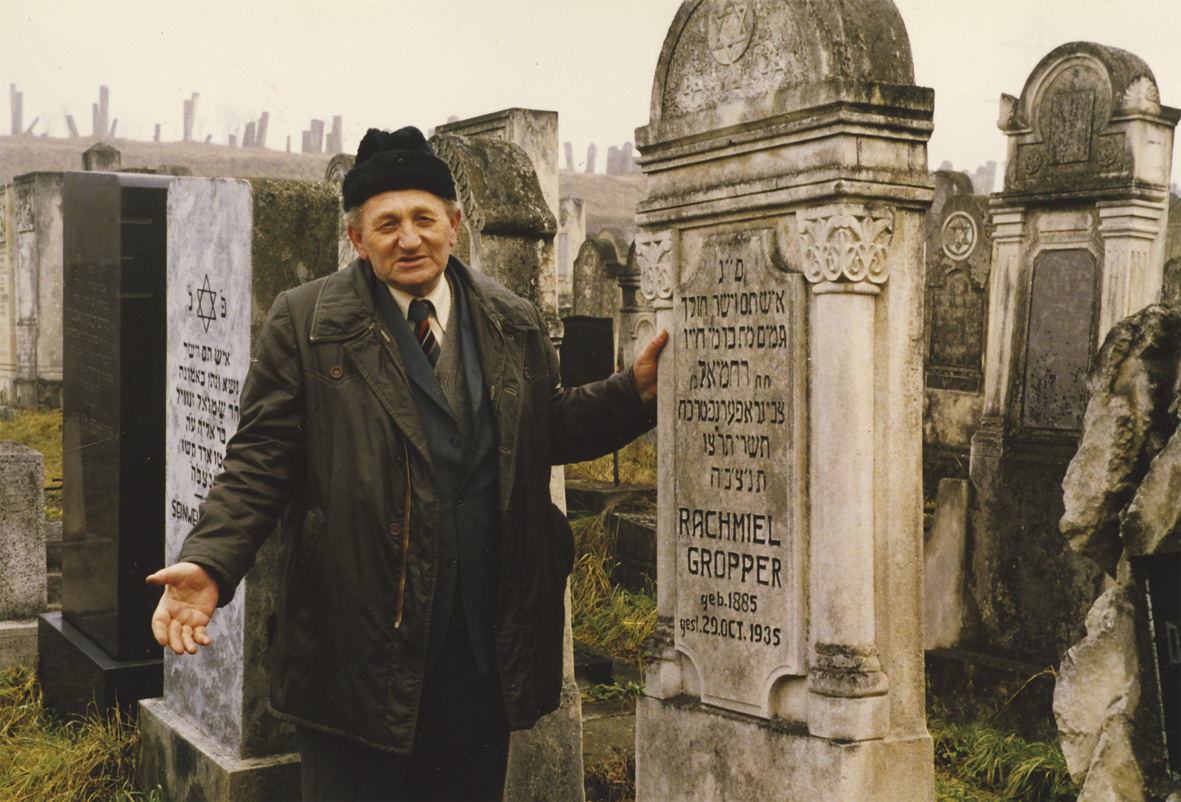“It is the strangest feeling when events that shaped your life become history, when you become objects of study.”
Die Papierene Brücke (The Paper Bridge)
“It is the strangest feeling when events that shaped your life become history, when you become objects of study.”
To say Ruth Beckermann's Die Papierene Brücke (1987) is a documentary would not be quite right in the contemporary sense of the word, but neither is it a work of fiction; instead, winding us through Eastern Europe, Beckermann weaves a personal story, her family's story, through the stories of others – debates in the synagogue, a visit to the cemetery, a Hollywood film set at Theresienstadt – each thread interweaving with the others, knotted with the contradiction and nuance that is often lost in the telling of these stories today. The film is surreal, with an Arvo Pärt soundtrack that ebbs and flows, but this mood goes hand in hand with Beckermann's attempts at reconciling, or bringing to light, the surrealness of her own family's journey.

The film opens on a fog-covered road. We follow a small buggy, trundling along through the mist as trucks speed by. With an eerie choral line, Beckermann asks us in voiceover: "The story of Hagazussa, do you know it?" ("Die Geschichte von Hagazussa, kennst du sie?"). Hagazussa, an old Austrian legend, is an invisible witch mingling among townsfolk in a small village. Yet, perfectly emblematic of the film as a whole is that the crux of the story is a separate story that Hagazussa tells within her own story, a story of two bridges in a small village, one of sturdy iron, and another the villagers dream of: one of cigarette paper (Zigarettenpapier). "Of course," the Hagazussa/Beckermann narrator relates, "the doubters, the proud, the disbelievers, will laugh at this and always use the iron bridge. [...] The others, however, will not hesitate and will not be afraid, and singing will pull them across the paper bridge into life." A bridge of cigarette paper, a bridge held aloft not by I-beams but by belief – die papierene Brücke. Belief in an innate humanity, a future – something that will pull you singing across the paper bridge into life.
But again and again, the film poses quandaries: What does it mean to have belief? and how? Is there any unifying narrative to the disparate journeys and impressions of everybody contained within the film? Ought there to be? "It is the strangest feeling," Beckermann relates, "when events that shaped your life become history, and you become an object of study." Yet that is the very root of Beckermann's film: her family, the people around her, become her object of analysis. Like Die Geschichte von Hagazussa, her film's story is that of other stories, each of which defies any common narrative other than a feeling that there is something within each that words cannot convey; these stories are almost parabolic in their simplicity, yet always the question is left hanging: where is the end? the moral? the deliverance? What is found in Beckermann turning the camera lens to these narrators? "Back from my journey, but not yet arrived. I've only arrived at a question," Beckermann says, "Who are we, the survivors' children? We, the second generation. What do we amount to? The dreams? The search? The duty to talk
about the past, as though the memories could be pinned down?"
Beckermann strives to find the identity for her second generation but discovers the
difficulty in this; as obvious as it may sound, it is clear that no one person in the film approaches their identity the same. This is evident as Beckermann follows an American television crew filming a Holocaust film at a recreation of the Theresienstadt ghetto. Beckermann follows the extras: Jews that volunteered from around Vienna, some of whom had been in the camp themselves. Why participate in something like this? One man who lived through the war in Vienna without having been sent to the camps wishes to act out what he was spared. He kept his composure pretty well, he says – until he saw an actor playing an SS officer: "From the deepest depths within me, it dug up things that had never crossed my mind since [the war]." Conversely, Beckermann mentions one of the Jewish extras wishes to play an SS officer himself. The finding of identity and the grasping of the aftermath for the generations after is clouded, as the filmreveals. The author Daphne Kalotay references her novel, Russian Winter, in a recent New York
Times Op-Ed to describe the feeling: "Second-generation storytellers have grown up with something pervading our existence. "Secondhand smoke"[...] At a remove yet just as toxic." The poet, Robert Schindel, also an extra on the set, relates something similar, citing that the children of survivors are more prone to depression than the adults. This "secondhand smoke" has clearly seeped into the cracks of the memories and recollections of the narrators. The cloud coats everything; too often, it is easier to identify what is not there than to identify what is. Beckermann's attempt at finding some identity is the crux of the film, yet there are no good answers to be found, only more questions: "Is there an arrival that doesn't signify the end?" she asks us.
Building upon her identity, Beckermann’s father speaks to the audience, describing his experiences as a Jewish citizen in the city of Czernowitz, located in the providence of Bukowina. Bukowina is an area that is a part of both Ukraine and Romania. In 1930, over 76,000 people or 12% of the population in the city identified as German speaking. In the city of Czernowitz, the city that Beckermann’s father grew up in, over 26.8% of people grew up Jewish. To put this number into comparison, only 20% of the city’s residents were Romanian at this time. In short, the majority of citizens in the city were Jewish. Beckermann’s father grew up in the city, still fondly remembering it as a part of his childhood. He remembers it as a city with “No antisemitism, no racism.”
Ultimately, though Beckermann’s father lived a good life in Chernowitz, he and his
family had to leave due to Nazi occupation and increased anti-semitism toward the Jewish community. Beckermann’s father had many options to move to, including the United States and Israel. For him, he did not see a point in moving to Israel as it was a newly established country without much opportunity. At the time, moving to the United States was unachievable for the Beckermann family due to the cost and distance. Austria was the one place that he saw an opportunity to “do something” with his life. Though Beckermann moved to Vienna, meeting and marrying his now wife and raising a family of his own, he never stopped being a “true patriot” to
the city that he loved, Chernowitz. Austria, after all, still had its fair share of problems. Back in Chernowitz, the Jewish community was well respected and honored. When coming to Austria, Beckermman’s father was met with anti-semitism from Hitler’s influence in the country, something that was never present in Czernowitz before Hitler’s rise to power. Because of this Beckermann’s father never felt like he was a true citizen of Vienna as he was never fully able to recapture the feeling of inclusion that he felt in Czernowitz.
Beckerman's inclusion of her father in her documentary further adds an aspect to identity and what it means to many people. Though many Jews were forced out of their homes during and after World War Two, they never forgot where they came from and what “home” meant to them. Though Beckermann’s father saw Austria as a “complete country,” moving to the country for a better life, he never forgot that Chernowitz was his one true home.

Benjamin Lopilato & Patryk Laska

